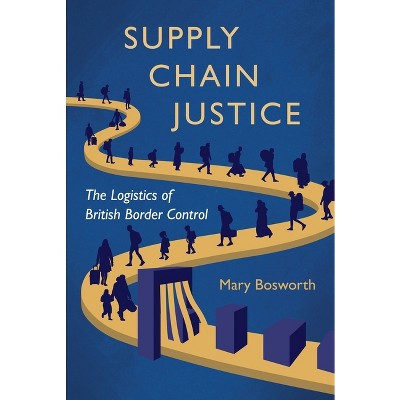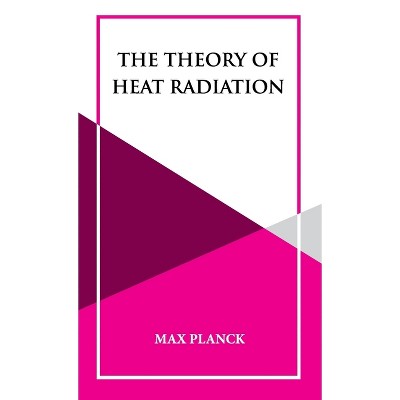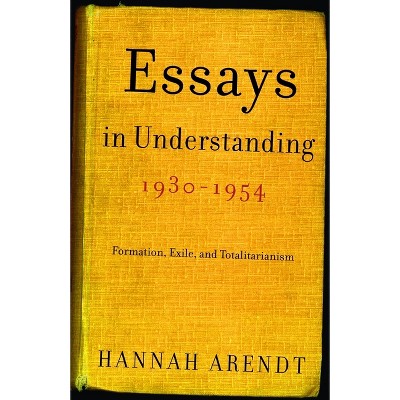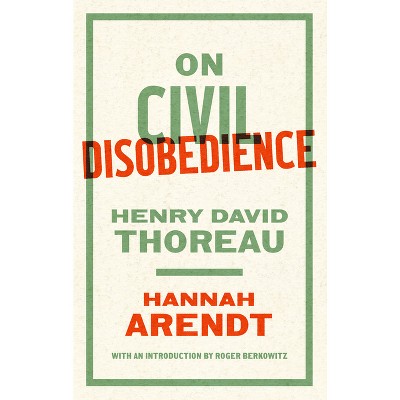Sponsored

Hannah Arendt's Ambiguous Storytelling - by Marcin Moskalewicz
$115.00
In Stock
Eligible for registries and wish lists
Sponsored
About this item
Highlights
- Through an original interpretation of Hannah Arendt's historiography, Marcin Moskalewicz reveals an under-acknowledged philosophy of history in her vast and variegated oeuvre, including the historical magnum opus, The Originsof Totalitarianism.Hannah Arendt's Ambiguous Storytelling argues that the key to understanding the fragmentary thought of Arendt is through the speculative and critical dimensions of the philosophy of history.
- About the Author: Marcin Moskalewicz is Associate Professor of Philosophy at Maria Curie-Sklodowska University in Lublin and Poznan University of Medical Sciences in Poland.
- 272 Pages
- Philosophy, Aesthetics
Description
About the Book
"Through an original interpretation of Hannah Arendt's historiography, Marcin Moskalewicz reveals an under-acknowledged philosophy of history in her vast and variegated oeuvre, including the historical magnum opus, The rigins of Totalitarianism. Hannah Arendt's Ambiguous Storytelling argues that the key to understanding the fragmentary thought of Arendt is through the speculative and critical dimensions of the philosophy of history. It unravels the essential aporia of Arendt's thinking - the discrepancy between political and historical meaning of events - and proposes its overcoming through aesthetic historical judgment. Reading her approach as "fragmented historiography", the project she was committed to reveals itself as the only credible methodological response to totalitarianism and scientific approach to history, which both function as a retrospective prophecy, erroneously presenting the past as a forecast of the future."--Book Synopsis
Through an original interpretation of Hannah Arendt's historiography, Marcin Moskalewicz reveals an under-acknowledged philosophy of history in her vast and variegated oeuvre, including the historical magnum opus, The Originsof Totalitarianism.Hannah Arendt's Ambiguous Storytelling argues that the key to understanding the fragmentary thought of Arendt is through the speculative and critical dimensions of the philosophy of history. It unravels the essential aporia of Arendt's thinking - the discrepancy between political and historical meaning of events - and proposes its overcoming through aesthetic historical judgment. Reading her approach as "fragmented historiography", the project she was committed to reveals itself as the only credible methodological response to totalitarianism and scientific approach to history, which both function as a retrospective prophecy, erroneously presenting the past as a forecast of the future.
A novel contribution to Arendt scholarship, this book will appeal to philosophers of history, political scientists and theorists alike.
Review Quotes
Is Arendt also among the philosophers of history?
In this intriguing study, Moskalewicz not only
distils a historical theory out of Arendt's work
but presents this theory as a key to her oeuvre.
This is a daring book, written with verve, adding
a major new voice to current debates on historical
meaning and representation.
Herman Paul, Professor of the History of the Humanities, Leiden University, the Netherlands
Pondering the perplexing incoherence of The
Origins of Totalitarianism, whose sections on
anti-Semitism and imperialism provide scant
explanation for the causes of totalitarian
politics, Moskalewicz arrives at a provocative
new understanding of Arendt's approach to the
relationship between historical narration and
acting in the present. Embracing inconsistency,
fragmentation, discontinuity and paradox, she
sought a way to tell the stories of the past that
would clear the ground for a radically new future
Martin Jay, Ehrman Professor of European History Emeritus, UC Berkeley, USA
What really impresses me with Moskalewicz is that he opens up a fresh reading of Arendt's writings.
He takes Arendt's argument seriously that after the breach in tradition (for which we only have the words 'Holocaust' or 'Shoah'), no solid scientific research can be done without critically reviewing the methodological presuppositions and consequences of scientific thinking.
Antonia Grunenberg, Professor Emerita, Hannah Arendt Centre, Carl von Ossietzky University of Oldenburg, Germany
About the Author
Marcin Moskalewicz is Associate Professor of Philosophy at Maria Curie-Sklodowska University in Lublin and Poznan University of Medical Sciences in Poland. Moskalewicz was Marie Curie Fellow at Rijksuniversiteit Groningen, the Netherlands, and University of Oxford, UK, EURIAS Fellow at Collegium Helveticum in Zurich, Switzerland, Fulbright Scholar at Texas A&M, USA, and Humboldt Fellow at Heidelberg University, Germany.Dimensions (Overall): 9.21 Inches (H) x 6.14 Inches (W) x .63 Inches (D)
Weight: 1.23 Pounds
Suggested Age: 22 Years and Up
Number of Pages: 272
Genre: Philosophy
Sub-Genre: Aesthetics
Publisher: Bloomsbury Publishing PLC
Format: Hardcover
Author: Marcin Moskalewicz
Language: English
Street Date: May 2, 2024
TCIN: 93288924
UPC: 9781350295872
Item Number (DPCI): 247-43-8456
Origin: Made in the USA or Imported
If the item details aren’t accurate or complete, we want to know about it.
Shipping details
Estimated ship dimensions: 0.63 inches length x 6.14 inches width x 9.21 inches height
Estimated ship weight: 1.23 pounds
We regret that this item cannot be shipped to PO Boxes.
This item cannot be shipped to the following locations: American Samoa (see also separate entry under AS), Guam (see also separate entry under GU), Northern Mariana Islands, Puerto Rico (see also separate entry under PR), United States Minor Outlying Islands, Virgin Islands, U.S., APO/FPO
Return details
This item can be returned to any Target store or Target.com.
This item must be returned within 90 days of the date it was purchased in store, shipped, delivered by a Shipt shopper, or made ready for pickup.
See the return policy for complete information.
Frequently bought together

$18.88
MSRP $27.00
Buy 2, get 1 free select books, music & movies
4.8 out of 5 stars with 572 ratings


$15.68
Buy 2, get 1 free select books, music & movies
4.7 out of 5 stars with 192 ratings
Trending New Books
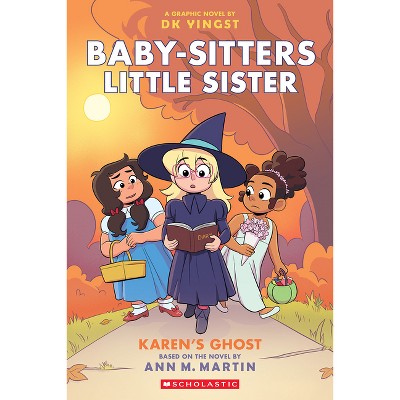
$8.82 - $21.00
MSRP $12.99 - $24.99
Buy 2, get 1 free select books, music & movies
3.7 out of 5 stars with 6 ratings

$7.00
MSRP $12.99
Buy 2, get 1 free select books, music & movies
4.7 out of 5 stars with 15 ratings
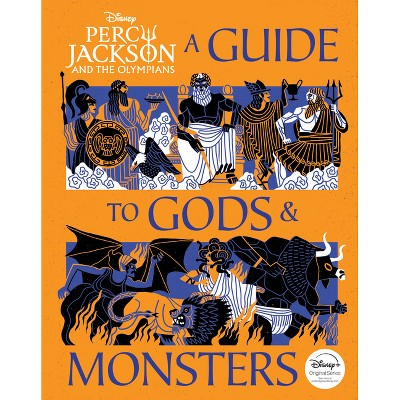
$12.80
MSRP $16.99
Buy 2, get 1 free select books, music & movies
5 out of 5 stars with 1 ratings

Highly rated
$10.94 - $11.18
was $14.99 - $20.99 New lower price
Buy 2, get 1 free select books, music & movies
4.6 out of 5 stars with 21 ratings
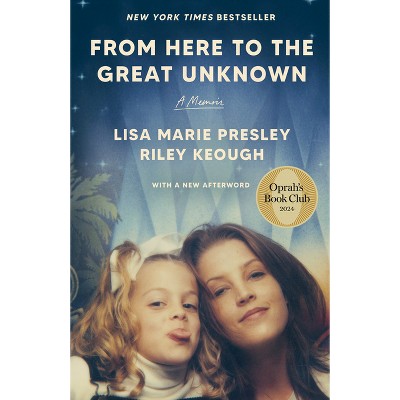
$14.99 - $17.08
was $20.00 - $32.00 New lower price
Buy 2, get 1 free select books, music & movies
4.8 out of 5 stars with 41 ratings

$14.59 - $19.48
MSRP $19.99 - $30.99 Lower price on select items
Buy 2, get 1 free select books, music & movies
4.3 out of 5 stars with 6 ratings
